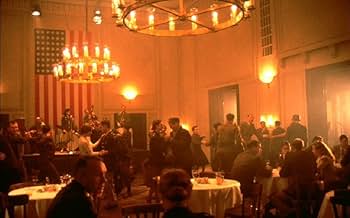Nach dem Ende des Zweiten Weltkriegs wird ein berühmter deutscher Dirigent der Loyalität gegenüber dem Naziregime beschuldigt. Er argumentiert, dass Kunst und Politik getrennt sind. Ein Ermi... Alles lesenNach dem Ende des Zweiten Weltkriegs wird ein berühmter deutscher Dirigent der Loyalität gegenüber dem Naziregime beschuldigt. Er argumentiert, dass Kunst und Politik getrennt sind. Ein Ermittler sieht das anders.Nach dem Ende des Zweiten Weltkriegs wird ein berühmter deutscher Dirigent der Loyalität gegenüber dem Naziregime beschuldigt. Er argumentiert, dass Kunst und Politik getrennt sind. Ein Ermittler sieht das anders.
- Auszeichnungen
- 9 Gewinne & 3 Nominierungen insgesamt
Empfohlene Bewertungen
This is actually one of the central themes of the work of director Istvan Szabo. In 'Mephisto' and 'Hanusses' he was also dealing with the Nazi era, but by telling WWII stories the Hungarian director does nevertheless talk also about all dictatorships, or specifically the Communist rule he knew directly.
The action of the film happens after the war, when Wilhelm Furtwängler, one of the greatest directors of the century stands on trial in a denazification tribunal for his cooperation with the Nazi regime. Despite many of the great musicians of the era he did not live Germany, he played for the Nazi dignitaries in Jews-free orchestras, and his opposition to the Nazi regime is unclear. He was not a Nazi party member, and he intervened to save lives of Jewish musicians, but yet was used a propaganda tool until the very end of the war.
The balance of the movie lies in the balance of the superb acts of the two principal actors. Harvey Keitel plays the American prosecutor major Arnold, while Wilhelm Furtwängler is played by the Sweidish Stellan Skarsgård. Arnold is the opposite of Furtwängler in almost any plane. To his moral superiority enhanced (maybe not necessarily) by filmed reports from the death camps is opposed Furtwängler's ambiguity and doubts, but his rudimentary culture is no match for the European refinement of the director. Keitel gives a strong act, maybe a too strong one, as his rudeness opposed to the doubts and maybe remorse of the German seem to give to the musician a postume and probably not deserved absolution.
The last scene shows Furtwängler living the building where the interrogation happened in the sounds of Beethoven's Fifth. The director switches to a real filmed concert with the same music, at the end of which Furtwängler shares hands with a Nazi dignitary (may have been Goebels, the Nazi minister of propaganda). The he is shown (twice, once in close plan) wiping his hand as in some kind of cleaning act. The question remains if a handkerchief is enough to clean somebody who shook hands with the Devil.
I personally thought the play was great and the film even better. The reason being that the film was able to portray scenes of Post-war Nuremburg and some vivid concentration camp scenes. (not for the weak of heart) to make its point. Nevertheless as in the stage production, the most vivid scenes still took place in the office of Captain Arnold between him and Dr. Furtwangler. The film roles being played by Harvey Keitel and Stellan Skarsgård. Was the relationship cruel to a point of excess by Capt. Arnold? How true were Dr. Furtwangler's version of life during the Nazi regime. ---??? I wish I could give an answer even to myself--Therefore, no spoiler is possible.
The film raises disturbing questions about the relationship of arts and politics.
As a conclusion, since this was a film with two intensely powerful actors, I would hope to see one or both up for a well deserved Oscar award.
The Major pursues Furtwangler like a rabid dog, determined to show that that Furtwangler was guilty of something.Why didn't Furtwangler leave when he had the chance? Did he seek out accolades from the devil?
Why is Major Arnold so Angry? It it the anger of a small man who feels spat upon by life, suddenly given the chance of bring down someone once so High and Mighty?
FurtWangler is aloof, distant, full of easy platitudes about the redemptive quality of Art. Major Arnold is mean and streetwise, quick to attack and condemn those who he does not understand.
Who is in the wrong? In the end does it mean anything to believe you are right? In whose eyes anyway? This film asks some difficult questions about how we perceive ourselves and others, how we question our most basic motives. Very Good.
For example: there are frequent references in the dialogue to Furtwängler's rival, Herbert von Karajan ("Little K.") Why did the Americans attack Furtwängler, and not von Karajan, who was an ardent Nazi? Furtwängler was prevented from conducting in the U.S., while von Karajan was lionized. Perhaps the makers of this film thought that the implications of this were too big to be discussed in the film. I'm sure that they didn't even want to go near the fact that the people who ran the de-nazification program were Americans with close ties to the Nazis themselves.
Also, Furtwängler's rationale for staying in Germany was somewhat more philosophical than the film implies. He thought he was defending the legacy of Mozart, Beethoven et al against the Nazis, and that this was a sacred responsibility. A bit of this comes out in the film, but in a superficial way.
With respect to the success of the film otherwise, Stellan Skarsgaard is excellent as Furtwängler, even managing to resemble him somewhat. I think that Harvey Keitel is somewhat hampered by the script -- the film would have been more successful if Keitel had come off as more conflicted and less one-dimensional. Clearly the director wished to imply that Keitel was conflicted, but that, as a military man, he was required to toe the line -- the frequent shots of Army indoctrination films (about how bad the Germans were) were intended to provide a rationale for Keitel's behavior. But the film would have been more compelling if Keitel were given an opportunity to express more doubts about what he was being asked to do. I also thought that the ending was a bit anticlimactic.
Wusstest du schon
- WissenswertesTo the criticism of both movie critics and American audiences of depicting the American Denazification officer Maj. Steve Arnolds (Harvey Keitel) as a "caricature, a bully, a Philistine," screenplay writer Ronald Harwood told The Jewish Journal that he went on to comb archives for denazification transcripts and to interview officials who had supervised such proceedings."They were morally brutal," Hardwood stated. "They bullied people, and they did behave in an extreme way. But they had just seen the camps, and no one in the world had seen that before."
- PatzerWhen Major Arnold is listening to the recording of Beethoven's Fifth Symphony, the record finishes the first movement and carries straight on to the second. Long playing albums, which ran at 33 1/3 rpm, were introduced in 1948, but the record shown is a 78 rpm one. The performance of the 5th Symphony would have been on a set of five 78 rpm records, one movement each, split over the two sides. It should not be possible for the second movement to start without the record being changed.
- Zitate
Emmi Straube: When he made his decision, he couldn't have known everything. Especially not the way people like you do, who've returned from exile and feel that you have a right to pass judgement. Because you are blameless, you think you know best who is a sinner and who deserves forgiveness. But you have no idea how people lived here.
- VerbindungenEdited into Taking Sides Again (2004)
Top-Auswahl
- How long is Taking Sides?Powered by Alexa
Details
- Erscheinungsdatum
- Herkunftsländer
- Sprachen
- Auch bekannt als
- Taking Sides
- Drehorte
- Produktionsfirmen
- Weitere beteiligte Unternehmen bei IMDbPro anzeigen
Box Office
- Budget
- 20.000.000 $ (geschätzt)
- Bruttoertrag in den USA und Kanada
- 188.952 $
- Eröffnungswochenende in den USA und in Kanada
- 22.051 $
- 7. Sept. 2003
- Weltweiter Bruttoertrag
- 422.832 $
- Laufzeit1 Stunde 48 Minuten
- Farbe
- Sound-Mix
- Seitenverhältnis
- 1.85 : 1


































